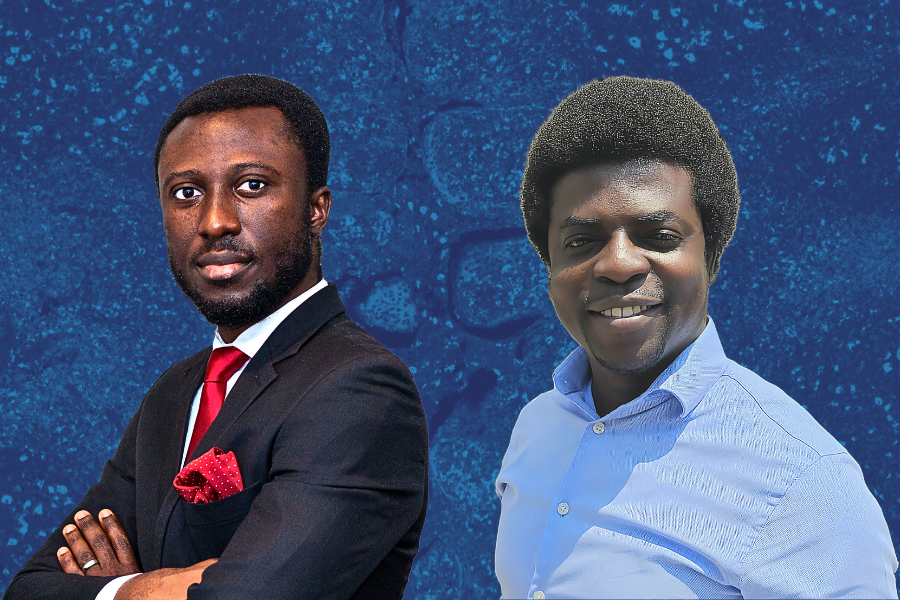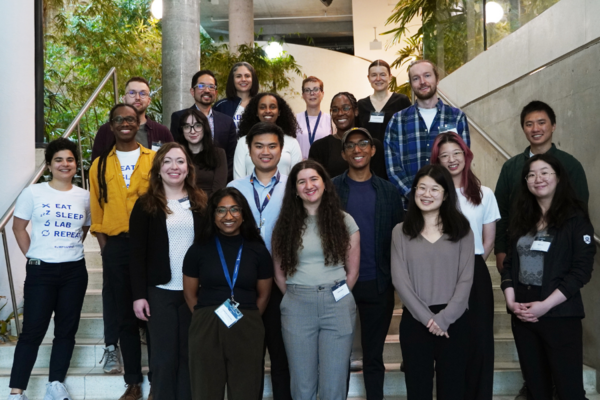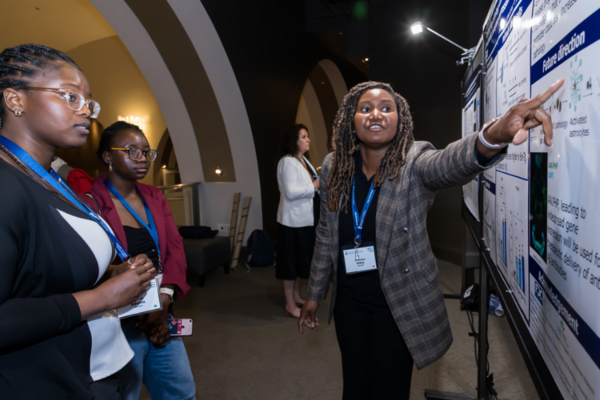Trainees work towards hope for global health

Earlier this year, trainees in Postgraduate Medical Education at the University of Toronto (PGME) ran a virtual event on “Progress and Hope in Global Health”. With around 100 faculty, residents and fellows in attendance, the audience also extended to include prospective trainees in different countries.
Two trainees in the Department of Laboratory Medicine and Pathobiology were members of the planning committee: Dr. Frank Sanya-Isijola, Medical Microbiology Resident, and Dr. Meshach Asare-Werehene, Clinical Chemistry Postdoctoral Fellow. Both had joined the event last year as attendees and were so affected by it that they decided to get more involved.
Primarily aimed at residents and fellows, the organizing committee wanted learners to learn about important topical issues in the field of global health and how they can provide solutions or play a part in improving health in their community, and on a global level. With particular focus on vulnerable populations, round tables included the topics of child health, ethics, Indigenous health, infectious disease, women and the law, equity in medical education, and politics and primary health.
Sanya-Isijola particularly enjoyed being able to moderate the session on Infectious Diseases. “It was excellent; very interactive and helped to show that there were a lot of public health gains in communicable diseases, including vaccine preventable diseases, but at the same time reflecting on the work that still needs to be done. Dr. Isaac Bogoch was the roundtable speaker for the session – he did an excellent job, and I learnt a lot from him”.
Asare-Werehene was struck by how limited access to some life-saving tests was, not only in some politically unstable regions of the world, but also in some areas of Canada. He was particularly moved by keynote speaker, Dr. Med Rashid, and his talk on refugee health. “It was very thought-provoking to hear how challenging it is to provide equitable healthcare to refugees and new immigrants in Canada. This is due to limited funding, lack of healthcare professionals interested in that line of work and other factors such as patient traumatic experiences. He called on trainees to consider offering professional support to these patient populations in addition to advocating for more funds”.
Also particularly impactful was an Indigenous health roundtable led by Roberta Pike, an Anishinabekwe from Henvey Inlet First Nation. Roberta shared interesting insights about some key healthcare challenges faced by the Indigenous population in Canada. As the Director, Indigenous Wellness, Reconciliation and Partnerships at Unity Health, Roberta also talked about the role she is playing to help provide equitable healthcare to these individuals at Unity Health. “It was the first time I had heard about her and the efforts that some hospitals are putting in place to ensure the provision of a comprehensive healthcare to the Indigenous population”, commented Asare-Werehene.
Involvement in the event has had a profound effect on the two trainees and, they hope, all participants.
“We live in an increasingly interconnected world, and recognizing this fact can help us appreciate and understand the world around us. On a global level, typical examples are infectious diseases, role of travel and their presentations in different populations. As trainees, understanding more about global health help us to see how diseases come to play, the risk factors, unique presentations that transcend boundaries and even depending on the topic, the different laboratory practices in other countries”, explains Sanya-Isijola.
He added, “The program helped me to realise that, as physicians, we have the power to influence and improve outcomes for global health not just in our practices, but in our communities and how we can work with others to help make the world a better place; and recognize that we can be agents of change”.
Asare-Werehene emphasized why it was so important to be part of an event like this. “Laboratory medicine trainees are the next generation specialists and cornerstone of our healthcare system, given that over 70% patient diagnoses are dependent on clinical diagnostic tests. Events like this enable us to develop a deeper understanding of global health concerns and how to deal with them effectively. The knowledge gained will put us in the forefront of accurate diagnosis, disease tracking and monitoring, research advancement and development of new diagnostic tools and therapies. Further, we will be competent in building formidable health systems, ensuring reliability and standardization of test procedures and results, as well as informing equitable healthcare policies and programs across different regions of the world”.
He was challenged by the day and it has already influenced him to make changes. “I went home asking myself how my expertise as a clinical biochemist will help advance the frontiers of global health within and outside the borders of Canada. Since the event, I have begun approaching healthcare delivery from a global health perspective, reached out to some experts for mentorship and hopefully I will tailor my practice and research to this area”.
See more
Postgraduate clinical training in LMP
Postgraduate Medical Education at the University of Toronto (PGME)
Dr. Sanya-Isijola and Dr. Asare-Werehene would like to congratulate the 2024 PGME Global Health Day Planning Committee for successful event. The committee was led by Judy Kopelow who played an instrumental role in coordinating discussions and meetings. They would also like to thank Dr. Barry Parkes, Dr. Patricia Houston (Vice Dean, Medical Education) and Dr. Meredith Giuliani (Associate Dean, PGME) for their support as well as all the guest speakers for sharing their knowledge and expertise.
This story showcases the following pillars of the LMP strategic plan: Inclusive Community (pillar 1), Dynamic Collaboration (pillar 2) and Agile Education (Pillar 5).



